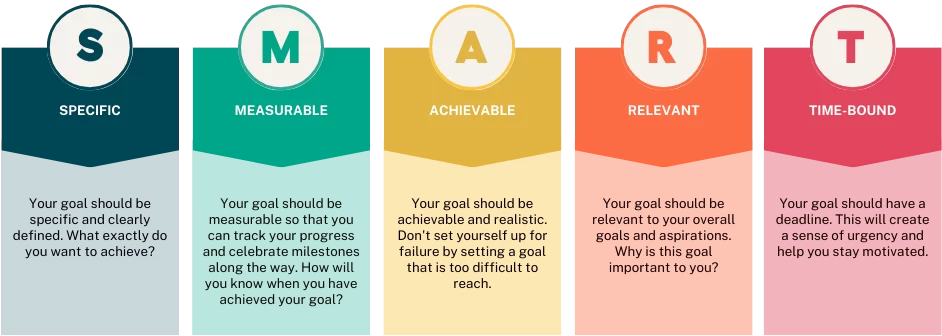5 SMART Goals For Certified Medical Assistants
Oct 04, 2023
Table of Contents
- What are SMART goals?
- Why are SMART goals important for medical assistants?
- 5 SMART goals examples
- How can medical assistants set SMART goals?
- What are some tips for achieving SMART goals?
Medical assistants play an essential role in the healthcare system. They provide administrative and clinical support to physicians, nurses, and other healthcare professionals. Medical assistants are in high demand, and the job outlook for this profession is expected to grow much faster than average over the next decade.
From streamlining patient check-ins to earning your certification, SMART goals give you a clear path to improve your skills and stand out in the healthcare field. You become more efficient, expand your knowledge, and increase your professional value by setting goals that are specific, measurable, achievable, relevant, and time-bound.
Setting SMART goals is a great way for medical assistants to stay motivated and on track. SMART goals are specific, measurable, achievable, relevant, and time-bound. By setting SMART goals, medical assistants can focus their efforts on the areas where they want to improve and achieve their career goals.

What are SMART goals?
SMART goals are an effective tool for setting and achieving objectives in various areas of life, including healthcare professions.
SMART stands for Specific, Measurable, Achievable, Relevant, and Time-bound.

Why are SMART goals important for medical assistants?
SMART goals are important for medical assistants because they provide a clear and structured framework for setting and achieving objectives. Medical assistants are very important in the healthcare industry, and their responsibilities often involve many tasks and responsibilities.
SMART goals are specific, measurable, attainable, relevant, and time-bound, which means they are well-defined, quantifiable, realistic, aligned with the patient care organization nursing staff's other goals and objectives, and have a clear deadline for where they would want to work.
5 SMART goals examples
1: Streamlining patient check-ins
|
Specifics |
Measurability |
Achievability |
Relevance |
Time-bound |
|
Reducing check-in time by 10 minutes |
Tracking average check-in times |
Implementing efficient check-in procedures |
Enhances patient satisfaction and clinic efficiency |
Achieve the 10-minute reduction within 3 months |
2: Learning injection administration
|
Specifics |
Measurability |
Achievability |
Relevance |
Time-bound |
|
Acquiring injection administration skills |
Successful completion of injection training |
Enroll in injection administration courses |
Expands medical skillset and increases value as a medical assistant |
Learn injection administration within 6 months |
3: Enhancing medical terminology knowledge
|
Specifics |
Measurability |
Achievability |
Relevance |
Time-bound |
|
Increasing medical terminology knowledge by 20% |
Regular assessments of medical terminology understanding |
Engage in medical terminology courses and self-study |
Improves communication and patient care |
Achieve a 20% increase by the end of the year |
4: Reducing medication errors
|
Specifics |
Measurability |
Achievability |
Relevance |
Time-bound |
|
Decreasing medication errors by 5% |
Tracking and documenting medication errors |
Implement error reduction protocols |
Enhances patient safety and trust |
Reduce errors by 5% within 12 months |
5: Achieving medical assistant certification
|
Specifics |
Measurability |
Achievability |
Relevance |
Time-bound |
|
Becoming a certified medical assistant |
Successfully passing the certification exam |
Enroll in a recognized medical assistant certification program |
Validates expertise and opens career opportunities |
Attain certification within 2 years |
How can medical assistants set SMART goals?
First, they need to identify a specific goal that they want to achieve, such as improving their patient interaction skills.
Next, they should establish measurable criteria to track their progress, such as receiving positive feedback from a certain number of patients.
The goal should also be achievable, meaning it is within their capabilities and resources. It should also be relevant to their role as a medical assistant and contribute to their professional growth.
Lastly, they should set a realistic timeline to accomplish the goal, such as within six months.
What are some tips for achieving SMART goals?
- Choose goals that are important to you and specific in what you want to achieve.
- Ask yourself why you want to achieve these goals to stay motivated.
- Set measurable, attainable, relevant, and time-bound goals.
- Create an action plan that outlines the steps needed to achieve your goals.








